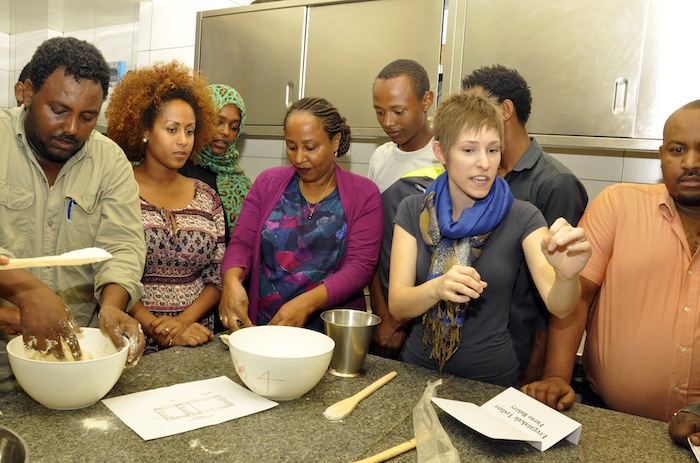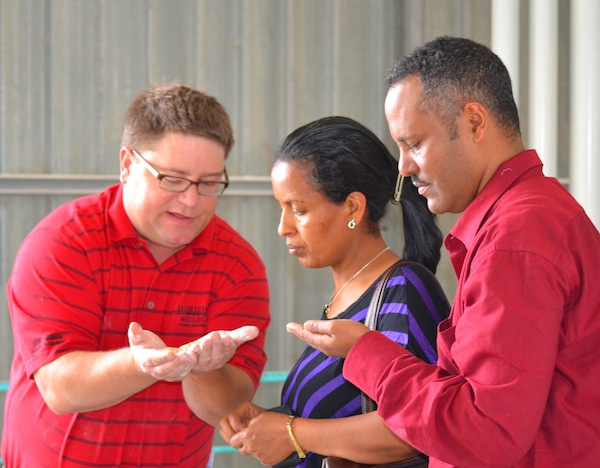Micronutrients with Macro Impact: The first fortified flour launches in Ethiopia, a boon for the country’s health and its economy
This week, Ethiopia is celebrating a significant milestone: One of the country’s largest flour mills, ASTCO, is launching the nation’s first mass-market fortified flour.
In a country where wheat makes up about two-thirds of the average person’s diet, and where malnutrition is robbing children of their childhoods and adults of their health and livelihoods, this is truly cause for celebration.
ASTCO is one of more than 150 companies who have participated in training sessions with our organization, Partners in Food Solutions (PFS), as part of a broader project to help them implement their own processes; and 20 more mills have received one-on-one assistance from international experts, which I’ll expand on later in this post. (The author is co-founder and CEO of PFS). Moreover, the Ethiopian government has worked with local universities and professionals from multinational corporations to create national standards for fortification, and passed legislation that will eventually mandate fortification for all wheat products.
The anticipated impact of this project is significant. Wheat millers and processors will improve their ability to manufacture better quality, fortified products and improve their production capacity, while improved standards, new products, improved awareness and capacity for micronutrient fortification, and stronger industry linkages will be created in this key food sector. It took private companies, government entities and nonprofit organizations pulling together to make this happen. In my opinion, this is the model of how public-private partnerships should work.
The volunteer experts helping ASTCO and the other millers who are working to fortify their products are all employees of four of the world’s largest multinational food companies: General Mills, Cargill, Royal DSM and Bühler. Partners in Food Solutions aggregates and deploys the expertise of these volunteers to promising small and growing food companies not only in Ethiopia, but across Africa. We make it possible for these world-class food experts to reach across the globe without ever leaving their offices or labs, and instead use email, Skype and our own cloud-based knowledge platform. This is remote knowledge transfer: We’re not sending money or food, and we’re not using finite resources to send large numbers of volunteers over to do the work. Instead, we’re sending our knowledge and skills — resources that only multiply as you share them.

(Above: Morgan Patrick, second from the right, a General Mills volunteer on the ground in Africa).
TechnoServe, our partner on the ground in Africa, helps identify high-potential small and growing businesses in five countries. Partners in Food Solutions volunteer experts, like the ones working with ASTCO, provide assistance in research and development, packaging, marketing, food safety and more to help these businesses grow.
In 2012, Partners in Food Solutions and TechnoServe, under the umbrella of the African Alliance for Improved Food Processing, formed a partnership with USAID Ethiopia to launch the wheat fortification project. This three-pronged partnership — public, private and nonprofit — created an indisputable multiplier effect. For every USAID dollar invested, corporate volunteers give the equivalent of two dollars in their time and expertise, tripling the value of government investment to in this important work.
At Partners in Food Solutions, we know that the way to eliminate food insecurity is not through more food aid. We aim our know-how and expertise from world-class food companies at the center of the food chain. We also work with more than 600 small and growing food processors in Africa who are building profitable business that can raise living standards in their communities by buying more crops from local farmers, hiring more workers and providing higher-quality food. This contributes to what we call a virtuous cycle: a healthier population contributes to a stronger economy, and a stronger economy helps make the population healthier.
(Left: A PFS volunteer and TechnoServe staff visually inspect wheat kernels to ensure compliance to specification).
We have many reasons to celebrate in Ethiopia this week: the increasing availability of vital micronutrients, a successful public-private partnership and a step toward a strong, self-sustaining economy. We know that Africa can feed itself. And this is the way it is going to happen.
Jeff Dykstra is a co-founder and CEO of Partners in Food Solutions.
- Categories
- Agriculture, Health Care
- Tags
- nutrition

